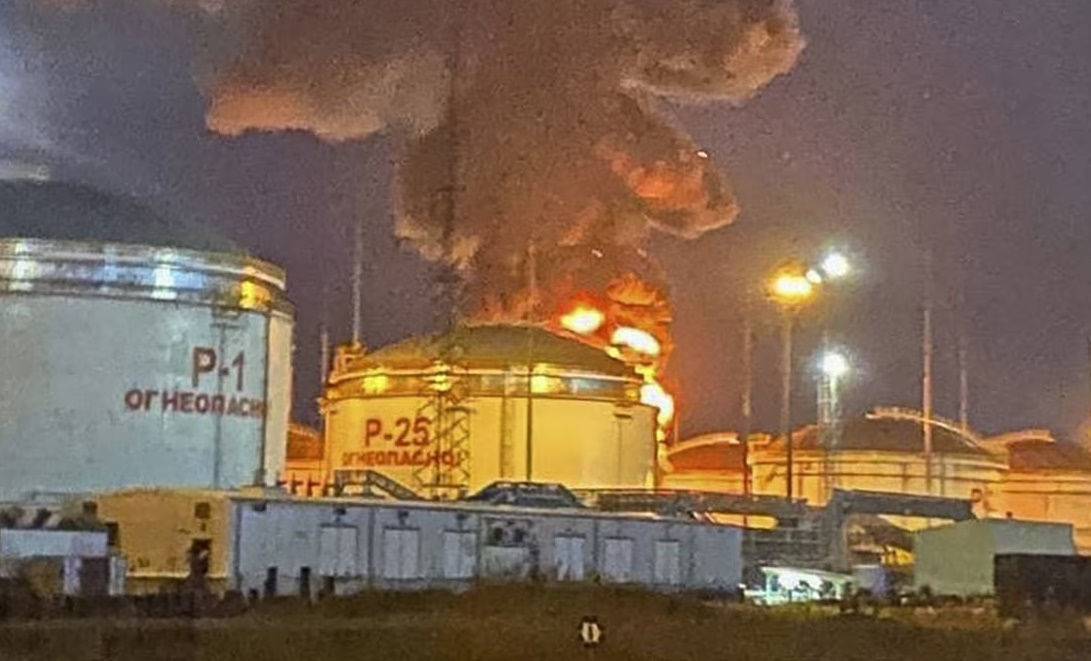Ukraine's intensified assaults on Russian oil infrastructure are disrupting oil and product exports, impacting both international markets and Russia's domestic supply. Despite these efforts, Russia remains heavily reliant on oil revenue. To curtail the income of a country waging unjustifiably brutal war against Ukraine and induce its fuel shortage, strategic measures need to be implemented, as analyzed by Apostrophe.
On February 9, an unidentified drone executed a successful attack on the Ilsky oil refinery in Russia's Krasnodar kraі, leading to a significant fire. Limited details are available, but it is clear that the assault effectively accomplished its objective.
On the same day, reports surfaced of explosions near the Afipsky Refinery in the Krasnodar krai. Limited information is available, but indications point to a fire resulting from the incident.
Ukrainian UAVs have previously targeted Russian oil refineries. Ilsk refinery experiencing kamikaze drone strikes in May 2023, both the Ilsk and Afipsk plants were attacked in May and October of the same year.
Lately, there has been a noticeable uptick in attacks on Russia's oil and gas infrastructure. In the month following the January 9 assault on the Rosneft oil depot in Oryol, approximately a dozen similar facilities across the Russian Federation have been targeted by drones.
While Russian authorities remain tight-lipped about these incidents, it is now evident that the recent attacks inflicted substantial damage on enterprises. Notably, the Ust-Luga plant in the Leningrad region, attacked on January 22, and the Rosneft Tuapse refinery on the Black Sea, attacked on January 24, experienced processing halts as a consequence.
In early February, Lukoil's Volgograd Refinery, one of Russia's largest oil refineries, was targeted amidst Europe's largest military build-up since World War II. The attack has resulted in at least a partial halt in petroleum product production by the company, impacting supplies to both the domestic Russian market and exports.
Fresh sanctions for Russia's inhumane war
In January, Bloomberg characterized drone strikes on Russian oil facilities as a "new front" in the Ukrainian-Russian war. This is a rather apt definition, as revenue from oil exports constitutes the primary budgetary source for Russia, a third of which allocated to fund the war against Ukraine.
While foreign allies refrain from direct involvement in hostilities, they are actively engaging on the "energy front," primarily through sanctions. In late 2022, Western nations imposed a price cap on Russian oil, followed by analogous restrictions on Russian-produced oil products in early 2023.
Russia, involved in extensive attacks on Ukrainian residential structures during this period, adeptly sidestepped oil sanctions, achieving notable success in the process.
‘Experience reveal that restrictions are inevitably overcome due to substantial financial interests. While additional control measures temporarily impede the flow, it eventually rebounds. Implementing new measures can prolong and increase the costs of evading sanctions’, the oil trading expert Oleksandr Sirenko said in a comment to Apostrophe.
Hennady Ryabtsev, Head of Special Projects at the Psyche Scientific and Technical Center, estimates Russia's oil export revenues was $169 billion in 2022 and $102 billion in 2023. However, much of this decline is attributable to lower oil prices. Excluding this factor, Russia incurred approximately a $20 billion loss due to imposed restrictions.
‘The ongoing relevance lies in the continued imposition of sanctions by the European Union, the British Commonwealth, and the G7. These measures are designed to thwart Russia's attempts to bypass both sanctions and the set price ceiling’, Ryabtsev says.
Russia bypass sanctions with the help of tanker fleet, with some vessels operating ‘in black’ and others in a ‘gray’ area. A portion of Greek-owned vessels fell under investigation by the U.S. towards the end of last year. Consequently, the number of Greek tankers transporting Russian oil dwindled from 40 in mid-2023 to eight in January. Shipowners are wary of U.S. sanctions. The result is the complete absence of Greek-owned vessels involved in the trade of Russian crude oil from Pacific terminals to buyers in China and India.
This is good though not sufficient.
‘The upcoming phase of sanctions could involve restricting tankers from accessing Russian ports. While not an insurmountable obstacle for Russian oil, it would notably complicate matters as they'd have to transport oil using their own tankers at sea and transfer it to vessels already there’, Sirenko says.
‘Detecting a violation would be straightforward: a legally registered tanker leaving empty and returning loaded must account for the sourced cargo. Navigation records precisely reveal the ship's location during cargo receipt. Turning off navigation may label the vessel as military, potentially resulting in it being targeted’, he continues.
Hennady Ryabtsev suggests three focal points for Western sanctions. First, target the ‘shadow fleet’ of tankers and the fictitious companies claiming ownership. Second, focus on banks facilitating financial services in Russian oil purchase contracts.
‘Illustrative of this is the situation involving the Chinese bank Chouzhou Commercial Bank, which halted collaboration with Russian partners after handling payment for Russian oil’, Ryabtsev explains.
According to the expert, the third facet of sanctions will target intermediary states involved in purchasing Russian oil, blending it with oil of other origin, and distributing oil products globally. India, in particular, will be affected.
‘These nations won't be compelled to entirely forsake such transactions but will need to execute payments in their respective currencies. For instance, India is compelled to settle payments for Russian oil in rupees, a non-convertible currency confined to domestic use’, Ryabtsev explain.
Russia is currently facing challenges in its oil supply to India. Following the Russian troops' incursion into Ukraine, India significantly heightened its oil purchases, becoming the second-largest buyer after China. Despite this, India opts to pay for these supplies in rupees, limiting the Russian Federation's benefit as these rupees can only be utilized within India. Consequently, there is a substantial decline in Russian oil imports by Indian firms, leading to a reduction in the country's revenue. This situation is further complicated by the freezing of tens of billions of rupees in Indian banks.
Systematic approach is needed
Let us shift our focus back to the Ukrainian military's activities on this ‘energy front’, though.
‘The Tuapse Refinery exports nearly 90% of its product. It took a significant blow, impacting Russian exports. The Russian response indicates awareness of a qualitative shift, as vulnerabilities in oil refining on the coasts of the Black and Baltic Seas, as well as across the entire European part of Russia, haveturned out to be within reach for Ukrainian drones. The realization sets in that air defense and electronic defense capabilities may fall short across the entire territory.The Russians understand that there will not be enough air defense and electronic defense equipment for the entire territory’, Mykhailo Honchar, president of the Center for Global Studies Strategy XXI said in a comment to Apostrophe.
Yet, for a lasting impact on export reduction, consistent strikes on Russian oil complex facilities must be regular, he argues.
‘Single actions yield only temporary outcomes. For instance, the assaults on the amphibious assault ship Olyengorsky Gornyak and the tanker SIG in the Novorossiysk port last August raised shipping costs and insurance payments in that area. However, without repeated attacks, the situation eventually stabilized', Honcharov explains.
Hence, strikes on Russia's oil infrastructure will be meaningful if they become more systematic.
‘Russia's annual petroleum product amount stands at approximately 280 million tons. Recent strikes on Russian oil refineries damaged equipment with a total capacity of 18 million tons per year. While this will not markedly affect Russia's oil product situation, it underscores the significance of refineries and oil depots as crucial targets. Consistent strikes on these facilities could induce fuel shortages in regions bordering Ukraine and compel the withdrawal of air defense equipment from the front line’, Honchar explains.
Russian oil products serve as both crucial exports for budget revenues and fulfill domestic market demands. A decline in exports naturally poses challenges for domestic consumption.
‘In Russia, there is a compensation mechanism where export-driven enterprises subsidize less profitable ones serving local consumers. A decrease in exports not only diminishes export revenue but also limits the ability to offset low prices in the domestic market. Consequently, fuel-producing factories in Russia face operational challenges, leading many to operate below full capacity due to the lack of profitability’, Honchar assures.
The demand for petroleum products within Russia includes requirements for the occupying army. Therefore, a decrease in exports and production could pose specific challenges for fuel supply to the Russian front.
It is crucial to note that Russia's upcoming planting season will boost demand for fuel, particularly diesel. Last summer, the Russian Federation experienced fuel shortages, and there is a possibility of a repeat this year. A disrupted planting season could lead to reduced harvests, undesirable for Russia as agricultural exports contribute significantly to its profits, which, in turn, fund the ongoing war.
In essence, the ‘energy front’ plays a pivotal role in Ukraine's potential triumph. The outcome hinges significantly on the sanctions imposed by our Western allies, while the Armed Forces will handle the rest.



